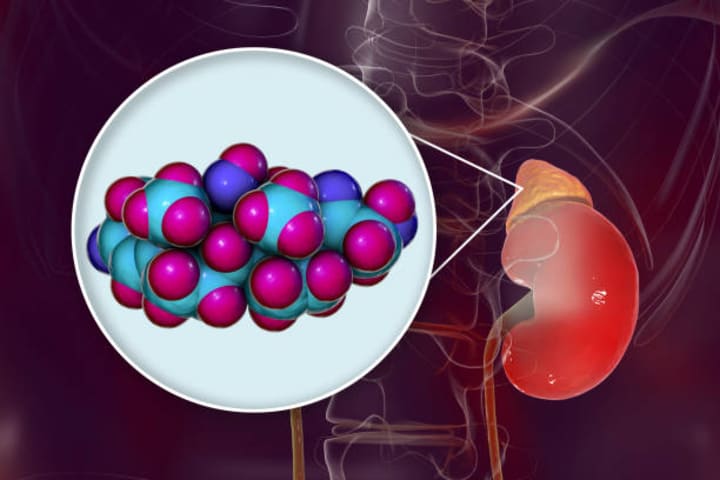Cortisol and Stress
Cortisol is closely associated with stress

Cortisol is closely associated with stress. It is a hormone which is the key element that works in the body's stress response and often measured as an indicator of stress. Cortisol has a vital role in the body's functioning, secreted by the adrenal glands. Primarily, it aids in the following functions to generate; proper glucose metabolism, regulation of blood pressure, insulin release for blood sugar maintenance, immune function and inflammatory response (Scott, 2018).

Cortisol levels vacillates among individuals and at various times in the day. The repeated daily cycle, typically, presents higher cortisol levels in the body in the morning and promoting lower levels at night. Cortisol is termed the stress hormone, because of the secreted higher levels during the body’s stress response and it’s responsible for several stress-related changes in the body. Small increases of cortisol have some positive effects, such as; quick bursts of energy for survival motives, heightened memory functions, increased immunity, lessor sensitivity to pain, and aids homeostasis (Scott, 2018). Cortisol is an important part of the body’s stress response, however, it’s also imperative the body’s relaxation response be activated, letting the body’s functions return to normal after a stressful event. But, in today’s high-stress environment, the body’s stress response is activated so often, not always giving the body a chance to return to normal, resulting in a state of chronic stress (Scott, 2018). Higher and more prolonged levels of cortisol in the bloodstream particularly those linked with chronic stress, have proven negative effects, such as; impaired cognitive performance, suppressed thyroid function, blood sugar imbalances i.e.; hyperglycaemia, decreased bone density, decreased muscle tissue, higher blood pressure, lowered immunity and inflammatory responses, slower wound healing, and other health consequences. Additionally, health concerns of increased abdominal fat can lead to greater health problems in other areas of the body. Significantly, health problems that are linked to increased stomach fat increases the possibility of heart attacks, strokes, developing metabolic syndrome, higher levels of “bad” cholesterol (LDL) and lower levels of “good” cholesterol (HDL), which results in greater health risks (Scott, 2018).
Body Logic MD, (2019) offer some people experience a greater spike in cortisol than others. Although, it is possible to lessen the amount of cortisol a person secretes in response to stressors, this can be accomplished using stress management techniques on a regular basis. Body Logic MD, (2019) enlightens people’s concerns about the amount of cortisol in their body, and wanting to bring about a healthy balance of hormones necessary for optimal health. Cortisol’s key role fuels the “fight or flight” response in the body. Encountering dangerous situations, the adrenal glands release cortisol into the bloodstream, the blood pressure rises, enabling the “fight or flight” response to prep in the body, creating immediate action. Blood sugar also increases to provide immediate available fuel for one’s muscles. After the threat passes, the cortisol levels go back to normal and homeostasis returns.

It becomes problematic when constant stress causes a person’s cortisol levels to remain elevated above a natural baseline. The variety of symptoms are quite uncomfortable and compromise a person’s quality of life. When high cortisol becomes a chronic issue, symptoms can include weight gain, depression, anxiety, and irritability and severe fatigue, high blood pressure, muscle weakness, acne and face flushing, headaches, difficulty concentrating and thin skin (frequent bruising). Furthermore, it is critical to mention that after prolonged exposure to elevated stress, HPA axis suppression can cause the body to produce too little cortisol, which disturbs healthy function. Symptoms of HPA axis suppression/adrenal fatigue are associated with fatigue, feeling overwhelmed, brain fog, insomnia, sleepiness, and food cravings (Body Logic MD, 2019).

Schimelpfening, (2018) edify people experiencing symptoms of depression tends to have reduced levels of serotonin in the brain and elevated levels of cortisol in their bloodstream. Since cortisol is related to stress, implementing a stress-management lifestyle could alleviate their depression. Current research on stress, the brain, and depression, suggest ongoing stress means the stress hormones are operating throughout the day for most of the day. This can be exhausting to the body and may cause the neurotransmitters in the brain like serotonin, ‘the feel good’ chemical, that is supposed to influence mood, appetite, and sleep, among other things, to stop functioning correctly, potentially leading to depression. Whereas, people not presenting depression, their level of cortisol in the bloodstream peaks in the morning, then decreases as the day progresses. However, about half of the people who live with depression, cortisol peaks earlier in the morning and does not level off or decrease in the afternoon or evening (Schimelpfening, 2018). Current studies have some uncertainty on how cortisol affects serotonin levels and other aspects of depression, still cortisol shows significance in other ways for people with depression. Schimelpfening, (2018) offers in an approach for therapy; findings expose people with elevated cortisol levels are less responsive to psychotherapy treatments, Therefore it might be useful to implement stress management techniques which seems to be better at reducing cortisol levels, and is an important part of the depression treatment regimen for patients (Schimelpfening, 2018).

Scott, (2018) offer there are many ways on how to stay balanced to maintain healthy cortisol levels and reduce stress. Techniques such as; guided imagery, journaling, self-hypnosis, exercise, yoga, listening to music, breathing exercises, meditation, and sex, are helpful ways in relaxing the body and mind. George, (2018) offers when a person is diagnosed with elevated cortisol levels they should avoid triggering other health problems in the attempts to reduce these elevated cortisol levels. The lifestyle change suggestions help reduce cortisol levels would include; get better quality sleep, exercise daily and learn new coping strategies for stress like mindfulness and breathing exercises, as well, take time out regularly to relax and down time. The therapist can device useful mindfulness exercises to manage their clients stress while reducing cortisol levels. Particularly in stressful moments a client can use deep breathing skills bringing their physiological response to stress under control within a few minutes of breathing. As the person breathes out they concentrate on relaxing a muscle group. Stress is usually caused by something which occurred from the past or worry about the future. Therefore, the client can take a short break from what they are doing, to bring their mind back to the present moment, stress generally will subside, when living for the moment. In keeping some perspective, the client can think about whether they are likely to remember the stressful situation next week and ask themselves if it’s really that bad. They can remind themselves of all the things they should feel grateful about. As well, stop and think, often the client is stressed about things they can’t do anything about. Rather than getting upset, look for a positive to concentrate on (George, 2018).

Schimelpfening, (2018) offers alternative and holistic strategies in helping reduce stress and maintaining cortisol levels for a healthier lifestyle.
1. Relax. Take some time every day to relax your body and your mind.
2. Meditation. Meditation is a proven practice to reduce stress and anxiety, boost mood, and alleviate physical ailments like headaches.
3. Massage. Touch therapy and massage has proven benefits to relieve stress, anxiety, and tension.
4. Art therapy. Color, painting, drawing, or photography can engage the inner artist to drive away stress.
5. Journal. Keep a journal, an outlet to free one’s thoughts and help to deal with stress and realize further potential.
6. Participate in something you love to do every day. Even if it's just for 10 minutes, e.g., read a novel, become absorbed in playing your guitar, can help unwind.
7. Exercise. Physical exercise boosts mood, helps increases serotonin levels in the brain.
8. Sleep well. Have a regular sleep pattern (getting up and going to bed at the same time) also helps stave off depression and improve mood.
9. Increase light exposure. Sunlight is preferable or therapy light can be helpful.
10. Curb caffeine. Caffeine could lower serotonin levels, consider reducing your intake.
(Schimelpfening, 2018).
In sum, Evidence based studies suggest to much stress has a negative impact on a person’s health with many of those negative effects linked to the hormone cortisol. Reducing stress is the best way to temper chronically elevated cortisol levels, which may help mellow effects of depression and other problematic or threatening conditions. These options consider engaging in some natural solutions to maintain cortisol levels (Schimelpfening, 2018). Furthermore, therapist may offer mindfulness and alternative approaches in the attempts to reduce excessive amounts of cortisol caused by chronic stress. Positively, there are proven ways an individual can reduce stress and keep their cortisol levels under control (George, 2018).
References
Body Logic MD, (2019). How to balance cortisol levels and relieve your symptoms of chronic stress. Retrieved from https://www.centermd.com/how-to-balance-cortisol-levels-and-relieve-your-symptoms-of-chronic-stress/
George, T. (2018). Cortisol, stress and your health. HIF - Health Insurance Fund of Australia. Retrieved from https://blog.hif.com.au/healthy-lifestyle/cortisol-stress-and-your-health
Schimelpfening, N. (2018). The role of cortisol in depression. Verywellmind. Retrieved from https://www.verywellmind.com/cortisol-and-depression-1066764
Scott, E. (2018). Cortisol and stress: How to stay healthy when you are feeling stressed. Verywellmind. Retrieved from https://www.verywellmind.com/cortisol-and-stress-how-to-stay-healthy-3145080
About the Creator
Shanie Walker
Shanie Walker is a Holistic Behavioural Therapist, awards, and honours in Art Therapy, Dialectic and CBT. Shanie is a Psychologist and Registered Professional Hypnotherapist. Accredited Nutritionist, and Master Degree in Fitness.
Enjoyed the story? Support the Creator.
Subscribe for free to receive all their stories in your feed. You could also pledge your support or give them a one-off tip, letting them know you appreciate their work.






Comments
There are no comments for this story
Be the first to respond and start the conversation.